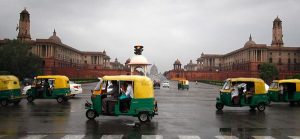Memo #220
By Simon Harding – sharding13 [at] gmail.com
 The gang rape of a young woman in a bus in New Delhi last December sparked a national debate about women’s safety on India’s public transport systems. The New Delhi Transport Department responded by reserving 1,000 corporate auto-rickshaw permits for female drivers in the hope of making autos safer for female passengers.
The gang rape of a young woman in a bus in New Delhi last December sparked a national debate about women’s safety on India’s public transport systems. The New Delhi Transport Department responded by reserving 1,000 corporate auto-rickshaw permits for female drivers in the hope of making autos safer for female passengers.
Under the policy, private companies willing to set up women-driver-only auto-fleets are to bid for a maximum of 250 permits each. However, while 35 companies are currently bidding for the 6,000 general unreserved corporate permits, there have been no bids for the women-only permits.
There are two major obstacles to establishing women-only auto-rickshaw fleets. Firstly,Delhi’s 70,000-strong auto-rickshaw sector does not have any women drivers. There are just two in training in this city of over 15m. Secondly, officials at the Transport Department admit that safety concerns prevent women from becoming auto drivers.
Women do a wide range of informal sector jobs in Delhi, such as ironing, washing and vegetable selling. But transport jobs are an entirely male domain. There are no female auto-drivers, taxi-drivers or cycle-rickshaw-pullers. Aside from cultural barriers, the work places individuals in vulnerable situations, requiring trips to isolated places and hours stretching late into the night. A recent survey found that 92% of working women in Indian cities felt unsafe, especially at night. Women in Delhi felt more unsafe than in any other city.
The women-driver policy fails to recognize that it is not solely male public transport workers who are responsible for sexual crimes; rather it is the wider male public which makes up the bulk of auto-rickshaw passengers, with whom any female auto-driver may be reluctant to deal. As such, the policy may be premature. Before female auto-drivers will be willing to take to the streets, the root causes of sexual violence in India must be addressed. These causes, advocates, activists and academics contend, are “systemic” and “attitudinal” and require long term societal changes. The shocking attitudes towards rape held by senior policemen, uncovered by an Indian news magazine, further emphasized the need for such systemic changes.
About the Author:
Simon Harding is studying for a PhD in Resource Management and Environmental Studies in the Institute for Resources, Environment and Sustainability at the University of British Columbia.

Auto-rickshaws, or “autos” for short, are a major form of transportation in many cities in India, including New Delhi.
Source: http://news.nationalgeographic.com/news/energy/2012/04/120412-delhi-india-auto-rickshaws/
Links:
- 35 Firms Bid for Auto Permits, None for Women Clusters, The Times of India, April, 2013
- Fear of Rape Stalks Indian Women, Inter Press Service, December, 2012
- How do we Stop Rapes?: India Looks For Answers, tehelka.com, December, 2012
- Tehelka Sting Expose: The Rapes Will Go On, tehelka.com
Related Memos:
- See our other memos on India
[…] let us try understanding Kejriwal’s electoral arithmetic.Electoral ArithmeticDelhi has close to 70,000 autorickshaws which guzzle CNG. What is more interesting is that each auto-rickshaw is driven in two, sometimes […]